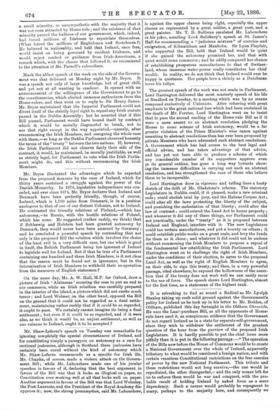Lord Hartington drew in vigorous and telling lines a hasty
sketch of the drift of Mr. Gladstone's scheme. The statutory Legislature in Dublin could, if it pleased, make a new criminal code; could abolish trial by jury, and the Habeas Corpus Act; could alter all the laws protecting the liberty of the subject, and punishing the molestation of that liberty ; could alter the law of contract ; could extend the Land Act to house property ; and whenever it did any of these things, our Parliament could not practically, under the " treaty " as it is proposed between Ireland and England, interfere with it. The new Legislature could tax certain manufactures, and put a bounty on others ; it could establish public works on a great scale, and levy the funds for them as it chose ; and whatever it did could not be undone without summoning the Irish Members to propose a repeal of the fundamental law establishing the Irish Parliament. Lord Hartington went on to challenge the right of Irish Members, under the conditions of their election, to agree to the proposed Land Act, as well as the right of English Members to agree, on their side, to sign this treaty, and then, in a very powerful passage, cited elsewhere, he exposed the hollowness of the asser- tion that if the treaty does not work well we can easily recur to the use of force. The speech shows Lord Hartington, almost for the first time, as a statesman of the highest rank.


































 Previous page
Previous page